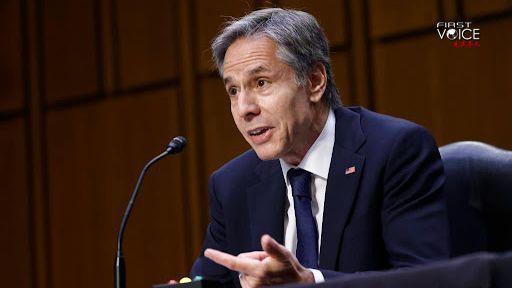
U.S. Secretary of State Antony Blinken. [Photo/Xinhua]
Editor's note: CGTN's First Voice provides instant commentary on breaking stories. The column clarifies emerging issues and better defines the news agenda, offering a Chinese perspective on the latest global events.
In a pair of TV interviews, U.S. Secretary of State Antony Blinken delivered Washington's "strongest" public criticisms yet of the outbreak of the Gaza conflict against Tel Aviv. Israeli tactics have meant "a horrible loss of life of innocent civilians," Blinken said, adding that any further ground captured by Israel would create a "vacuum filled by chaos, filled by anarchy, and probably refilled by Hamas."
In an interview with CNN last Wednesday, U.S. President Joe Biden also pledged not to supply offensive weapons if the Israeli forces push into Rafah – over concerns for the well-being of the more than 1 million civilians sheltering there. While tens of thousands of lives have been killed in Gaza since the October 7 incident, Washington's public criticisms against Tel Aviv are believed more a result of political calculations.
Since Israel and Hamas exchanged fire last year, the White House has been steadfastly supporting the Benjamin Netanyahu government, agreeing with its position that it had the right of self-defense. But with Israel pushing forward with an operation in Rafah, the U.S.-Israel relations are "strained like never before." Divergent views on the Gaza conflict and calculations over their political futures contribute to tensions in Biden-Netanyahu ties.
To begin with, with the death toll still rising in Gaza, the Biden administration – as a staunch ally of Israel – is under mounting pressure both at home and abroad to act against the violence. Since April, protest encampments calling for a ceasefire in Gaza have popped up on college campuses across the United States.
According to the CBS News poll conducted in April, Biden's handling of the Gaza conflict is down to the lowest levels, with an increasing number of Americans wanting their President to persuade Israel to stop military actions in the region. The high level of disapproval has made its way to the ballot box. While Biden won Michigan – a swing state that each party has said they must win to take the Oval Office in November – with more than 623,000 votes four years ago, Dearborn, Dearborn Heights and Hamtramck with large Arab and Muslim populations turned against Biden in Michigan's primary.
Arab Americans even shunned Biden's campaign manager as she visited Michigan. "It's unfathomable at this point in time that we're trying to talk about electoral politics with a genocide unfolding," Al Jazeera quoted Abdullah Hammoud, the Mayor of Dearborn, a Detroit suburb as saying.
With the clock ticking towards the November general election, Biden is under urgent task to win 2020 voters back and consolidate his base. For the Biden administration, holding up the delivery of heavy bombs to Israel and harshly criticizing the Israeli government in public would be the first step to pacify domestic voters.

Photo taken on April 23, 2024 shows destroyed buildings at Bureij refugee camp in the central Gaza Strip. [Photo/Xinhua]
Biden's changing attitude to the Netanyahu administration is also believed to be partly a result of Israel's strategic value to the United States. Unwavering support for Israel has been a consistent element of Washington's Middle East policy – while the U.S. offers its ally an unparalleled amount of aid, Israel, in Senator Lindsey Graham's words, functions as the "eyes and ears of America" in the region.
However, Israel as Washington's strategic chess in the Middle East is increasingly becoming a burden. With the escalation of the Gaza conflict, Netanyahu, on several occasions, has brushed off Washington's warnings and is growing increasingly resistant to Biden's private pleading for a ceasefire. "If we have to stand alone, we will stand alone," Netanyahu was quoted by AP as saying.
While Biden has prided himself on his ability to manage Israel, Netanyahu's determination to fight in Gaza and refusal to bow to Washington has hindered U.S. strategic maneuverability in the Middle East. The Biden administration struggling with domestic headaches has no intention of getting embroiled in another conflict, but Israel's tactics could make a large-scale confrontation increasingly inevitable in the region. This, apparently, is not what Washington is happy to see.
"A special relationship with Israel does virtually nothing for the United States while actively undermining U.S. strategic interests and often doing violence to the values that Washington claims to stand for," Jon Hoffman, a research fellow in defense and foreign policy at the Cato Institute, said in an opinion on the Foreign Policy.
By publicly denouncing Israel's acts in Gaza, the Biden administration is beginning to wield its stick to Israel so as to better manipulate its strategic chess in the Middle East. Shouting "humanitarian considerations," the Biden administration cares more about making the best use of a carrot-and-stick approach for its selfish political calculations.

 中文
中文



